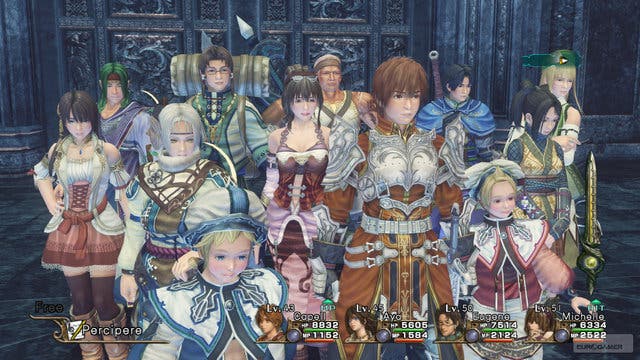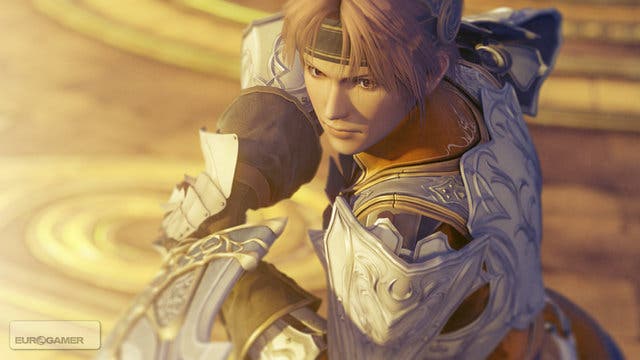Infinite Undiscovery
Better keep looking.
You only ever have direct control of Capell, and the closest he comes to magical abilities is his flute, which can play tunes with different effects. If you want to utilise other attacks, you need to "Connect" with the other character's abilities, which enables you to direct their specific special attacks, or to aim ranged attacks. It sounds interesting, but it's an inelegant solution to a simple problem, and one that requires close proximity to the character in question and far too much button-fiddling for a game that gives you no breathing room in battle. You could get the exact same effect far more efficiently simply by swapping control to other characters completely, learning those abilities yourself or just being able to pause the game while in the menu. As with so many of the supposedly revolutionary features, it seems tri-Ace was so busy thinking up different ways to do the same old things, they didn't bother to check if the result actually improved the experience for the player.
Instead you spam away on the fast and strong attacks, using the same three combos over and over. Your companion's AI is actually extremely good, which means you rarely have to worry about them. The enemy, on the other hand, is hilariously stupid and so any team with a decent emphasis on healing spells and a stock of health potions is able to stomp through huge swathes of the game with little to no challenge. There are even moments where the whole cast is utilised, with you dividing the characters up into three different teams to fulfil different combat objectives at the same time. It's a great idea - one that could have defined the game with a more thoughtful design - but it's used so rarely and in such uninspired ways that it feels more like an afterthought than a stroke of genius.

That's probably just as well, since while combat is the game's dominant element it's also the most technically problematic. The frame-rate is a fragile beast, felled by the slightest activity on screen, and this isn't just an occasional dip under extraordinary circumstances. Every hit results in an explosive burst of light, and it seems this is just too much for the limping engine to handle. Just Capell's strong attack, used on its own against a couple of foes, can result in a frame-rate that looks more like a series of freeze frames. As you'd expect given this poor showing under basic conditions, as the battles become larger the game runs progressively slower. Mass Effect showed that a compelling game can overcome an imperfect graphics engine, but this level of near-constant slowdown is simply unacceptable.
It's not even as if the game is all that special to look at. The character models are decent, if oddly doll-like, but environments are empty and without interaction or features of note. Invisible walls block apparently open plains, while the way ahead almost always involves slogging around the map, looking for some unmarked canyon that will lead you to the next area. High-def aside, there's really nothing here that the PS2 couldn't have handled - and indeed did handle, with the more impressive sections of Final Fantasy XII. Even the audio is dodgy, with voice acting that ranges from passable to atrocious. At least, that's when the game is actually using dialogue. It frequently switches to silent subtitled narrative scenes, sometimes within the same story sequence, with jarring effect.

There's a modicum of replay value, since the different difficulty levels feature more content the harder they get, but these take the form of more (or different) story scenes rather than any serious amount of additional gameplay. Side quests, such as they are, simply involve stumbling across Person X, taking some item from them, and delivering it to Person Y in some distant town - usually the one you're conveniently headed towards. Although you're free to trek between maps, there's no quick way of moving around the game world and as the story keeps moving you in one direction, the incentive to explore dims with each passing hour. For those who keep track of such things, you can expect to spend between twenty and thirty hours on a normal playthrough.
With Star Ocean IV and Tales of Vesperia due next year, and Final Fantasy on its way to the 360, this needed to be something quite special to make its mark in a genre not known for its deviations from formula. Yet at its best Infinite Undiscovery is just another standard action JRPG following a strictly linear route through the same predictable story about another reluctant young hero overthrowing yet another evil empire. In its worst moments, it's an unwieldy collision of ill-conceived ideas and sloppy technical implementation that will test the patience of even the most hardened player. Such flaws are really only worth tolerating if you're so devoted to the JRPG genre that you'd settle for mediocrity rather than wait for the good stuff.








